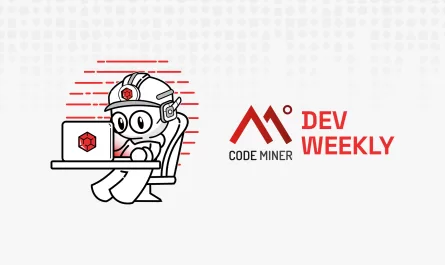HELLO EVERYONE!!! It’s March 28th 2025 and you are reading the 54th edition of the Codeminer42’s tech news report. Let’s check out what the tech world showed us this week!
Golang on the PlayStation 2 – by Ricardo
Ricardo explores the fascinating challenge of running Golang on the PlayStation 2 in this first part of a series. He dives into the technical constraints of the PS2’s MIPS architecture and limited memory. The post outlines initial steps, like setting up a cross-compiler and adapting Go’s runtime. It’s a nostalgic yet innovative experiment for retro gaming enthusiasts and developers. A promising start to an unconventional programming journey!
How to Write Blog Posts that Developers Read – by Michael Lynch
Michael Lynch shares insights from nine years of blogging about software development, highlighting what makes posts resonate with developers. He emphasizes understanding your audience, choosing accessible topics, and ensuring discoverability via search engines or communities. This practical guide helps developers craft content that stands out and attracts readership.
How Apple Pay Handles 41 Million Transactions a Day Securely 💸 – by Neo Kim
Neo Kim breaks down the engineering behind Apple Pay’s ability to process 41 million daily transactions. He highlights the use of tokenization, device-specific numbers, end-to-end encryption for security, the scalability is achieved through distributed architecture and real-time fraud detection and more. A clear look at how convenience meets robust security!
3 ways to build forms in react (without any libraries) – by Corina Udrescu
Corina Udrescu offers a practical guide to creating forms in React without external libraries. She covers controlled components, uncontrolled components, and the useRef hook approach. Each method is explained with pros, cons, and simple code examples. It’s perfect for developers seeking lightweight, vanilla solutions for form handling.
You should know this before choosing Next.js – by Eduardo Bouças
Eduardo Bouças shares critical insights for developers considering Next.js for their projects. He discusses its strengths, like server-side rendering and static site generation, alongside limitations. Key points include deployment complexities and potential performance trade-offs. The post urges careful evaluation of project needs before committing. A must-read for informed framework decisions!
Using HTTP request body for Rails routing: Slack integration case study – by Robert Pankowecki
Robert Pankowecki details a creative approach to Rails routing using HTTP request bodies. Focused on a Slack integration, he explains parsing JSON payloads to determine routes. It’s a niche but valuable technique for custom API handling. Great for Rails devs exploring unconventional routing!
Introducing content-visibility: auto – A Hidden Performance Gem – by Christian Ekrem
Christian Ekrem introduces the CSS property content-visibility: auto as a performance booster. He explains how it defers rendering of off-screen content, reducing load times. The post includes benchmarks showing significant improvements in page speed. It’s a simple yet powerful tool for optimizing web applications. A hidden gem for front-end developers!
Creating Reusable code in Rails: Plugins, Metaprogramming, and Best Practices – by ggerman
This article explores strategies for writing reusable code in Rails, focusing on plugins and metaprogramming. The post covers building modular components and leveraging Ruby’s dynamic features. Best practices like testing and documentation are emphasized for maintainability. It’s a deep dive into crafting efficient, scalable Rails applications. Ideal for intermediate to advanced Rubyists!
Next.js rocked by critical 9.1 level exploit… – by Fireship
Fireship’s video covers a critical 9.1 severity exploit recently discovered in Next.js. The flaw, tied to server-side vulnerabilities, could allow attackers to execute arbitrary code. It explains the exploit’s impact and the urgent patch released by the team. A fast-paced breakdown keeps viewers informed and engaged. Essential viewing for Next.js users!
How to Balance Password Security Against User Experience – by The Hacker News
This useful article examines the trade-off between password security and user convenience. It discusses strategies like multi-factor authentication and passwordless logins to enhance protection. The article stresses minimizing friction while maintaining robust defenses against breaches. Real-world examples illustrate practical solutions for businesses. A timely read for security-conscious developers!
TypeScript Migrates to Go: What’s Really Behind That 10x Performance Claim? – by Oskar Dudycz
Oskar Dudycz investigates bold claims of TypeScript adopting Go for a 10x performance boost. He dissects the technical feasibility, comparing JavaScript’s runtime to Go’s compiled efficiency. The post questions whether this is a genuine shift or exaggerated hype. It’s a thought-provoking analysis of language evolution. Perfect for TypeScript and Go enthusiasts!
🦀 Building a search engine from scratch, in Rust: part 1 – by Jérémie Drouet
Jérémie Drouet kicks off a series on building a search engine using Rust. Part 1 focuses on setting up the project and indexing basic data structures. He highlights Rust’s performance and safety features as key advantages. A solid start for Rust learners and search tech fans!
Authorization in Next.js – by Robin Wieruch
Robin Wieruch provides a comprehensive guide to implementing authorization in Next.js. He covers role-based access, JWTs, and integrating with APIs like Auth0. The tutorial includes practical examples for securing routes and pages. It’s a straightforward resource for adding authentication to Next.js apps. Great for developers prioritizing security!
Languages, Tools & Framework releases
Node v18.20.8 (LTS)
Node.js releases version 18.20.8, an LTS update focused on stability and security. This patch includes bug fixes and minor performance enhancements for the v18 branch. It’s recommended for production environments needing long-term support. The release notes detail specific changes for developers to review. A routine but essential update for Node users!
—
And that’s all for this week! Wish you all a great weekend and happy coding!
We want to work with you. Check out our Services page!



